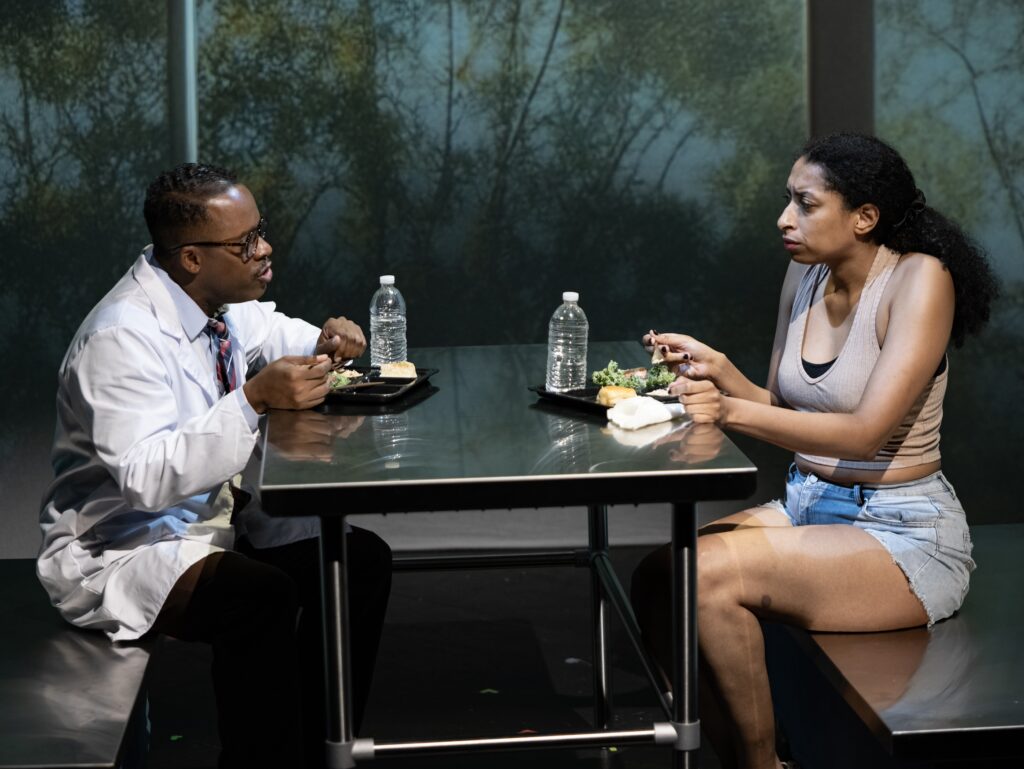A Pernicious Virus, Capitalist Greed, Racism: ‘The Bleeding Class’ Tackles Our Tough Times
If this all sounds pretty grim, playwright Chisa Hutchinson’s dialogue is inflected with humor and whimsy that are enhanced by Cezar Williams’ s direction and the work of his design team.

“The Bleeding Class,” a new one-act drama by a rising playwright and screenwriter, Chisa Hutchinson, traces the progress of a pernicious virus clearly modeled after Covid-19. In a program note, though, its author discloses that she began work on the piece back in 2019, “months before an actual pandemic hit. It was meant to be commentary on capitalist greed and highlight folks who tend to get dehumanized by it.”
Ms. Hutchinson might have also specified racism, since that factor looms as large as any other in “Class,” now having its off-Broadway premiere. The mysterious plague in this play, identified as HXNX, threatens our country and the world until hope arrives in the form of a Black doctor who specializes in urology and one of his patients: a Black Hispanic woman, the daughter of an undocumented Dominican immigrant, who happens to work for an escort service.
Adina Moreno — or Sugar, as she calls herself — turns up at Dr. Wesley Pennington’s office after a client infected with the virus drops dead during her visit. Worried she may follow suit, despite having never been sick in her life, Sugar submits to a series of tests, during which the doctor discovers she has an industrial-strength immune system: one that, as he puts it, instantly “shreds” any potential threats.
The plot thickens when a business partner of Sugar’s late client turns up. Wyatt Kilgore, a white man, is described in the character listings as “a kind of Machiavellian entrepreneur”; he’s also a revolting bigot. Yet when the doctor proposes they work together to find a cure for the virus — partly to protect Sugar and himself and to help save humanity, though personal ambition is also a factor — Wyatt is game.

Thus, as cases of HXNX and its death toll rise — national and international figures are periodically reported in ominous voiceovers — Sugar becomes a coddled lab rat, spending her days donating plasma and watching cable television. Via news reports, she learns that others who share her background have it worse: A family of immigrants is demolished in a fire set by a man spewing racial slurs, blaming them for the pandemic; copycat attacks ensue.
The irony is obvious: As a Black Hispanic woman literally gives her blood to help preserve the human species, the world outside is holding accountable for the crisis people who could be her relatives. A pair of twists that occur late in the show only highlight the extent to which outsiders, and people of color in particular, are persecuted and exploited under such circumstances.
If this all sounds pretty grim, Ms. Hutchinson’s dialogue is inflected with humor and whimsy that are enhanced by Cezar Williams’ s direction and the work of his design team. Scott Fetterman’s sparkling, winking projections are a standout, whether evoking lab chemistry or flashing an image of Sugar’s crush, the celebrity chef Marcus Samuelsson, whom she calls “my future husband.”
Leading lady Tamar Lopez, in a winning off-Broadway debut, emphasizes Sugar’s spice; lean and long-legged, she strides the stage like she owns it, offering a stark contrast to Reginald L. Barnes’s earnest, charmingly awkward Dr. Pennington. But the actors ease into an engaging chemistry, forged in part from the abuse that has marked her life and his own experience with tragedy — and, it goes without saying, the discrimination both have encountered.
Wyatt, on the other hand, is reduced to sheer caricature. Played by the fair-haired, pale-skinned Jackson Hayes, he refers condescendingly to Sugar’s “urban charm” and suggests that the doctor “mighta been a basketball player” — and that’s to say nothing of his screaming sexism, or his reprehensible greed. In a flashback toward the end, we meet Wyatt’s deceased colleague, one Thomas Faraday, voiced by Mr. Hayes, who manages to be even more repellent.
Our troubled history and continuing struggles with racism were, of course, thrown into stark relief by numerous developments during the pandemic, from the murder of George Floyd to statistics reflecting Covid’s impact on minorities. So “The Bleeding Class,” for all its fantastical and broadly comic elements — which can be diverting and delightful — might have benefited from just a bit more nuance in this respect.

